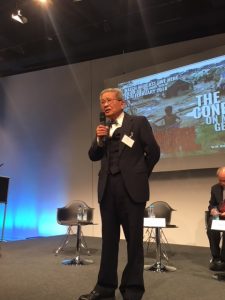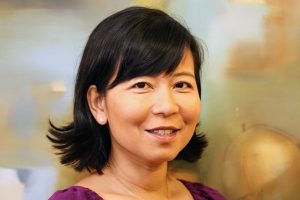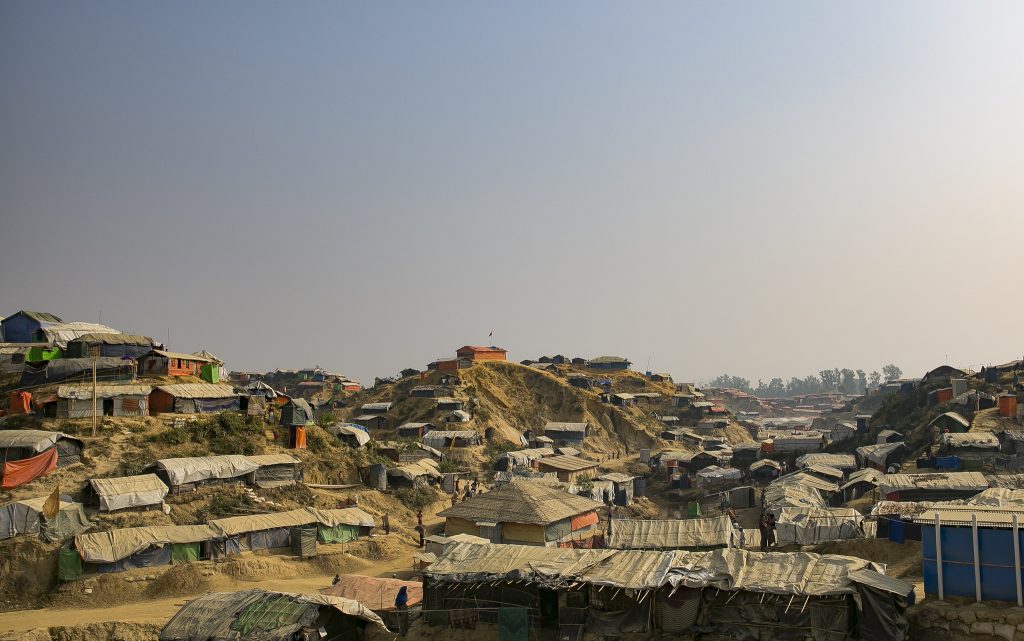The brutal surge of violence against the Rohingya in their home country of Myanmar has sent 800,000 people fleeing to refugee camps in Bangladesh in what some have called a “slow-burning genocide”—leaving many to ask whether a Burmese resistance exists.
At the Berlin Conference on Myanmar Genocide in late February, I had the chance to ask Burmese dissidents and Rohingya survivors about whether there were any reports of “righteous Burmese” similar to the celebrated “righteous gentiles” who resisted during the Holocaust. The Burmese people at the event said resistance in Burma is very difficult and made rarer by the pervasive brainwashing of the Burmese Buddhist public, who have been largely convinced to regard reports of atrocities against the Rohingya as “fake news.” Hla Kyaw, a Rohingya doctor, said that he was sure there were cases of Buddhists helping out their Rohingya neighbors, although he had not yet heard of any. As with the Holocaust, it may be years before the stories of secret humanity among the Buddhists of Myanmar come to light. In the meantime, the resistance is flourishing in the Burmese diaspora in America and Europe, where it is safer to voice dissent.
At the Berlin Conference, elder dissidents were joined by representatives of the younger generation of activists. Perhaps the firiest speech at the Berlin conference came from U Kyaw Win, a global elder among Burmese dissidents. Win, a longtime friend of Myanmar’s leader Aung San Suu Kyi, is an archetype of the older generation of pro-democracy activists who ultimately loosened the grip of the military junta over Myanmar.

U Kyaw Win was an early exile who publicly criticized Burma’s military junta in the 1960s and published The Burma Bulletin in an attempt to publicize human rights abuses in the country. He lobbied the U.S. Congress for suspension of financial support for the junta for decades. Win fiercely dismissed the belief that the ethnically Burmese, or “Bamar,” own Myanmar and rejected the claims to primacy over other ethnic groups that have led to such brutality toward the Rohingya and other groups like the Shan, Mon, Karen, and Kachin. “Before the people who now inhabit Burma, there was nothing but land. All of them came from somewhere else or descended from people who came from somewhere else,” he said, referring to the tactic of Buddhist nationalists to dismiss the Rohingya as immigrant Bengalis.
U Kyaw Win pulled no punches about what is happening in Myanmar, saying that “what happened at Dachau and Auschwitz is going on in Burma. It is a slow genocide. It is a way of getting rid of a certain group of people—you can do it quickly or very slowly.”
“Burma is a multicultural society where we once lived in harmony,” he added.
Win was introduced at the conference by Harn Yawnghwe. Yawnghwe, who is referred to affectionately as “uncle” by some of the younger Burmese activists, spoke of Win with palpable reverence.
But Yawnghwe’s story is no less remarkable. Yawnghwe is the son of Sao Shwe Thaike, a Shan ruler who became the president of the new Republic of the Union of Burma in 1948. Sao Shwe Thaike, himself Shan, worked for inter-ethnic harmony in Burma, including the rights of the Rohingya. Thaike once said, according to Yawnghwe, “If the Rohingya are not indigenous to Burma, neither am I.”
When General Ne Win launched a military coup against the government, which would usher in the fifty-year rule of the Tat Ma Daw (military junta), Yawnghwe’s father was arrested, dying months later in prison without seeing his family again. Yawnghwe’s mother involved herself in revolutionary activities in Burma, forming the Shan State army to fight for Shan independence, while Yawnghwe stayed abroad, where he had gone to study. In 1988, when Aung San Suu Kyi appeared as a figurehead for the people’s uprising, Yawnghwe relocated to Canada and began dedicating his energy to extensive pro-democracy activities in Myanmar.

Asked about the growing evidence of Aung San Suu Kyi’s lack of commitment to true democracy and inter-ethnic peace, he says, “There could have been many signs in the past, but I did not recognize them, or I did not want to.” Yawnghwe—the founder of the Brussels-based Euro-Burma Office, an organization that provides funding to ethnic and civil society organizations—has not been allowed to enter Myanmar since June 2017, but continues to work for democracy and peace in the country from abroad. “I was able to work in Myanmar under the military regime without being physically in the country,” he said. “Today it is no different.”
When I ask Harn Yawnghwe about the resistance, he said, “The word resistance might be misleading. All we are trying to do is make people aware that the ‘other,’ the neighbor, the foreigner, is also a human being.”
“We are just advocating for people to do what is right,” he continued. “Once there are enough people, no one can stop us. The people we are working with are normal people who have compassion and can see past the propaganda and hate. General Ne Win atomized society and isolated individuals—fear was the main tool. The current regime is trying to re-impose division, and we are trying to drive it back.”
Khin Mai Aung, a New York–based lawyer who focuses on racial justice and immigration rights, is one of the faces of the younger generation of Burmese activism in the diaspora. Aung, who also spoke at the Berlin conference, has been active in seeking out connections with other activists in the diaspora and raising up their voices through her citizen journalism.
“I followed Myanmar’s transition to democracy but was not deeply involved in political activism concerning Myanmar until recently,” she told Tricycle. “I began writing about Myanmar because I was alarmed that so few Burmese—especially Buddhists, like me—were speaking out about the Rohingya crisis last fall. Examining that crisis more closely revealed the parallels between the right-wing populism in Myanmar and here in the United States, and allowed me to see the true nature of identity group oppression in the Myanmar, which is the focus of my work here in the States.”

Assessing the size of the Burmese resistance, Aung said, “It’s larger than it seems. People are afraid of military operations or social backlash. One woman said she’s been called out in public for her opinions. The country has lived under military control for some time, and it doesn’t have a strong foundation for a civil society. People have difficulty distinguishing fact from state fiction, having lived under military propaganda for so long.”
One activist Aung has connected with is Aye Aye Dun, the co-founder of Saddha: Buddhists For Peace, a campus-based organization. Saddha put out a moving video last October called “On The Rohingya: Burmese American Buddhists Speak,” which Dun said was “addressed to our parents and older generation of Burmese, calling for solidarity and compassion.”
Dun told Tricycle that her experience of being a minority in the US, where xenophobia and racism appear to be on the rise, sensitized her to the much worse plight of the Rohingya in Myanmar. She has responded by focusing on building connections within the Burmese diaspora between different ethnic and religious groups from Myanmar.
“I think coming together to support one another in America, and perhaps eventually conceiving a more political diasporic identity of unity, could help send a message of solidarity to people in Burma with similar goals,” she told Tricycle. “Our diaspora is so multi-ethnic, multi-faith, and multi-cultural; we have divisions and problems, yes, but this is a diversity that should be celebrated. The diaspora of Burma is not just Buddhist—it is Hindu, Muslim, and Christian as well.”
Yawnghwe agrees that the diaspora affords opportunities for inter-ethnic reconciliation. “In the past, we worked together regardless of one’s ethnicity or religion. I do not see why it should be different now,” he said.
“There are many unsung heroes and heroines who are working quietly without recognition or funding,” he added, explaining that in many cases their identities and activities cannot be safely exposed. “It can be dangerous.”
Thank you for subscribing to Tricycle! As a nonprofit, we depend on readers like you to keep Buddhist teachings and practices widely available.
